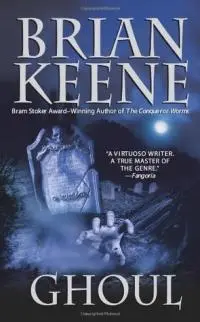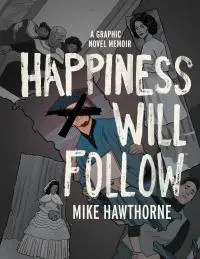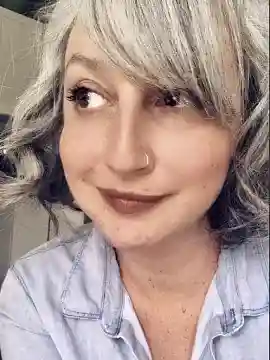Photo courtesy of the author
Brian Keene is a prolific author of horror, primarily, but has crossed over into many other genres, including dark fantasy, crime drama, and non-fiction. He is probably most well known for his zombie horror and his podcast, THE HORROR SHOW (which he recently retired to focus more on writing). If you are a horror fan and you're late to the Brian Keene fandom party (Hey, I was too!) let me recommend my favorite and my first Keene read, Ghoul.
Something about Brian that I think is most remarkable is that he is a natural mentor. It's almost like he can't help himself. It's just what he does. As a professional reviewer in a predominantly male-centric community, Brian was one of the first leaders of the horror industry to reach out and guide me through various situations. He showed me the ropes and then taught me how to navigate them for myself. He has helped me and my business immensely over the last few years and I have no doubt that many, many people would say the same if they had the opportunity. It is an honor to interview him and pick his brain on all matters concerning horror, writing during a pandemic, and other important topics. As per usual, he is a gifted storyteller, even when he's just catching up with friends.
As a monthly subscriber to your Patreon, as well as a newsletter subscriber, I’m pretty well up-to-date on what you’ve openly shared with your fans about your life in 2020. Is there anything you’d like to share about last year that maybe you held back or want to highlight for people reading this interview?
I mean, when I look at the day-to-day of 2020, we didn't have it as bad as so many other people. My youngest son and his mother lived with Mary and I for a good portion of the year, and given all of the uncertainty and upheaval going on in the world at the time, that worked out well for all of us. We could sort of collectively man the ramparts together. Mary and I are both writers, so it's not like we lost our jobs. Maybe we took the self-quarantine thing a little more seriously than many of our friends, but I'm glad we did. I did some math on New Year's Eve. I knew thirty-seven people—personally—who contracted the virus in 2020. For most of them, it wasn't any worse than the flu, I guess, and for some of them, it wasn't even that bad. But two of those thirty-seven died, and two more of them have long-term complications that the doctors say will be with them forever. So...I don't know. That's two dead—a friend and a family member. And two more who are going to have problems for the rest of their lives. I can't judge anyone else, but here? We're going to continue to take this shit seriously in 2021.
 I do, however, feel very disconnected from the genre community, though. In January of 2020, I spent a weekend up north visiting Christopher Golden, Joe Hill, James A. Moore, Bracken MacLeod, and a few other friends. That was the last time I've really interacted in person with anyone outside of my immediate family since the quarantines started. We switched over to recording the podcast via Skype not long after that. I've done a few socially distant visits with Wesley Southard, Stephen Kozeniewski, Bob Ford, Geoff Cooper, Cathy Gonzalez, and Matt Wildasin over the past year, but they were brief (like fifteen minutes or less) and at a distance, and while wearing a mask, and it wasn't the same, you know? And I felt nervous after each one of those visits, and for the next two weeks, I waited to see if any of us showed symptoms of the virus. After a while, it just seemed easier not to do socially distant visits at all. So, I haven't participated in one of those since...late August, I think? Since then, it's just been me, Mary, my youngest son, and his mother, with a very occasional 20-feet away and masked up visit from my oldest son.
I do, however, feel very disconnected from the genre community, though. In January of 2020, I spent a weekend up north visiting Christopher Golden, Joe Hill, James A. Moore, Bracken MacLeod, and a few other friends. That was the last time I've really interacted in person with anyone outside of my immediate family since the quarantines started. We switched over to recording the podcast via Skype not long after that. I've done a few socially distant visits with Wesley Southard, Stephen Kozeniewski, Bob Ford, Geoff Cooper, Cathy Gonzalez, and Matt Wildasin over the past year, but they were brief (like fifteen minutes or less) and at a distance, and while wearing a mask, and it wasn't the same, you know? And I felt nervous after each one of those visits, and for the next two weeks, I waited to see if any of us showed symptoms of the virus. After a while, it just seemed easier not to do socially distant visits at all. So, I haven't participated in one of those since...late August, I think? Since then, it's just been me, Mary, my youngest son, and his mother, with a very occasional 20-feet away and masked up visit from my oldest son.
So, I miss people. I miss being in person. I miss signings and conventions. I miss meeting the people who read my books. I miss sitting down with friends and talking shop. I don't think Zoom or FaceTime are good for that. It's not the same, you know? So, I guess this year I'll be looking for ways to reengage—ways beyond Zoom or FaceTime but ways that are still safe. Personally, I doubt we'll have conventions before summer, at the very earliest. And even if we do have them, I can't see myself attending, as things stand in this country right now. A lot would have to change, in regards to vaccine distribution and the public taking things more seriously.
A favorite question I like to ask authors is their highs and lows. Can you do that for us now? Like maybe 5 highs for 2020 and 5 lows?
Professional Highs for 2020—hitting number one on Amazon's best-seller chart not once, but three times (for End of the Road, Trigger Warnings, and Unsafe Spaces. Making a lot of progress on J.F. Gonzalez's literary estate, as far as getting things back into print and figuring out what to do with the unfinished stuff he left behind. Two successful online fundraisers for the Scares That Care charity, of which I am a board member. Seeing a lot of newer authors whom I've tried to help really come into their own in the past year, despite the state of the world and the business. And finally, a gig that came my way that I've been referring to as PROJECT CASTLE. I can't say any more about it than that, but folks will learn about it in 2021 (under its real name), and I hope they'll be as excited as I am. Suffice to say, I'm getting a chance to play with some of the coolest, most coveted toys in the horror genre, and I'm doing my best not to break them while putting on a good show.
Lows for 2020? Well, we, as an industry, lost people this past year. That always sucks. I think it sucked worse because of the pandemic and social distancing, and there was no way for us to collectively come together in person and mourn their passing. The wholesale collapse of the comic book market is definitely a low. Don't get me wrong. Comics will end up enduring and coming out the other side. They always do. But that will take another two or three years, and it will be a vastly different landscape when the dust finally settles. A lot of creators, publishers, and retailers are going to be hurt between now and then. (Brian Keene: COMICS)
Looking back over everything last year, are there any new revelations or lessons you’ve taken away from your experience? How about personally and professionally?
No new revelations or lessons that I can think of. More like confirmation of things I've known a long time. When the shit hits the fan and their backs are against the wall, people will show you who they really are—good or bad. Remember what they showed you about themselves when things are going well.
If someone new to the horror genre came up to you and said, “I want to get a very well rounded idea of what horror fiction has to offer, please recommend 3 books I should read from 2020 only—which books which you choose?
 Oh, geez...that's not fair. I can only pick three? Okay, but I don't want anyone hollering at me on Twitter that I didn't mention this book or that book. It's Sadie's fault. She limited me to three! (laughs)
Oh, geez...that's not fair. I can only pick three? Okay, but I don't want anyone hollering at me on Twitter that I didn't mention this book or that book. It's Sadie's fault. She limited me to three! (laughs)
Three books published in 2020 that will give you a well-rounded look at the horror genre... I'm going to say The Only Good Indians by Stephen Graham Jones, The Magpie Coffin by Wile E. Young, and an anthology called We Are Wolves. I think those three cover all the sub-genre and literary style bases. But there are fifty more I could name. Seriously. Despite being a tire fire of a year, 2020 was an amazing time for horror fiction, both in the mainstream and the small press. And although it's not horror, I want to mention Happiness Will Follow by comic artist Mike Hawthorne. It is a heartbreaking and captivating memoir about family, abuse, surviving, and what it means to be Puerto Rican not only in America, but here in Central Pennsylvania where Mike and I both live. It does have some light supernatural elements to it, but it's not horror. Regardless, it was the best thing I read in 2020, hands down.
Personally, the role I see you playing in the online horror community is as a “Do no harm but take no bullshit” kind of guy. If you see something shady going on, you deep dive into that situation so that you can expose the rumor and get to the bottom of things; shed some light on an otherwise murky situation. Now that you have retired from podcasting, do you still see yourself as being responsible in that kind of role or are you retiring from public scandals too? SUB-QUESTION: How distracting was all of that from your writing career?
I love the horror genre. I was born in 1967. I sold my first story in 1997. I was a horror fan for those first thirty years. Now, I'm lucky enough to make my living giving back to a field that has given me so much enjoyment. So, I have always acted to protect the genre. And so have others. Maybe I'm the loudest, but there are many others from my generation, and the generation before us, who have done the same. We were doing it back in the late Nineties and early aughts with [the] Jobs In Hell [newsletter]. And we're doing it now.
The difference is, this new generation of creators. There are a lot more of them willing to stand up and speak out against bad actors who are actively harming the field than there were when we were starting out. And these days, it's nice to sit back and let them do that. I won't lie—it makes my average workday easier to know that other people give a shit about this business and want the best for it and want to shepherd it. And while I won't speak for Mary, Christopher Golden, Bryan Smith, Michael Bailey, Nick Mamatas, Jim Moore or anyone else from my generation, I'll bet it's a load off their shoulders, as well. It's nice to hear about something heinous—a publisher ripping off authors, for example, and sigh heavily, and log on to deal with it, only to discover that Gabino Iglesias or Samantha Kolesnik or Bracken MacLeod have already handled it. (laughs) And not just those three. Like I said, there are a LOT more people willing to step up. The genre is in good hands.
What are you most proud of in the last year?
My sons. My oldest turned 30, and he's a social worker. He cares for developmentally disabled adults all day, and has continued to do so throughout this pandemic, at risk to himself, because it is what he is compelled to do. My youngest turned 12 and has begun that transition from kid into teenager, but he's still kind and thoughtful to others—qualities that are sometimes temporarily forgotten when you become a teen. I love them both and am so incredibly proud of them both. And I'm proud of how 2020 didn't sap their creativity, either. My oldest plays guitar and bass and spent much of the year writing new songs. And my youngest has continued to write stories and design video games and produce content for his YouTube channel. I often overhear him on Zoom or FaceTime with author Somer Canon's oldest son, who is his age. It's neat listening to the creative children of two creative adults creating together.
If given the opportunity, is there anything you would do differently?
I would have spent more time with my cat, Max. He was an old guy, and earlier in the year, I had to have him put to sleep—cancer. He and I used to nap together for forty-five minutes every day. Had I known, I would have extended those naps to a couple of hours each day.
Looking into the blank slate of 2021, what gets you out of bed in the mornings—what projects are you looking forward to?
Right now I am knee-deep in the aforementioned PROJECT CASTLE, a novella called With Teeth, and the novel Submerged: The Labyrinth, Book 2. After those, I'll be working on a mainstream western tentatively called The Last Stand, finishing a novella called Dead Air, the next Levi novel which is Invisible Monsters, the fourth book in the Lost Level series, and The Fall, which is pretty much my magnum opus, I guess. The Fall is the final book in the Rising series, and certainly the longest thing I've ever written. It will probably top out at 200,000 words. All of those will be finished this year, with the exception of The Fall.
Are there any big changes for Brian Keene this year? Not so much a resolution that you desire to uphold, but more like a career path, genre shift, something outside your typical “rise & grind”?
Not really. Like I said, I consider myself lucky that I get to give back to a genre and fandom that have given me so much joy. It is a grind, doing it every day, but it's a grind that I still enjoy, and I've been successful enough at it that I don't have to do it for as long, every day. That's what's important to me. More time with loved ones. Less time living inside my own head.
I'd like to get better at answering email and texts as such, but as we're doing this interview, my inbox has 2,987 unread emails. So...I don't see me getting caught up anytime soon. And frankly, I've quit worrying about it. There are only so many hours in a day. Family and writing comes first. I suspect I'll double down even more on that in 2021.
Lastly, there are so many up and coming indie authors out there with big aspirations and a hungry outlook on 2021, do you have any advice for them to help them succeed in their writing goals?
It really is as simple as sticking to a schedule. It's best to write every day, but if you can't, then find a schedule that works for you. The key to becoming successful—meaning that you can quit your day job and become a full-time writer—is to have enough stuff in print that you're getting regular royalty payments. The only way to do that is to produce. The only way to produce is to sit down in the chair and put your fingers on the keyboard. Fifteen minutes a day. An hour a day. Twenty minutes on a Saturday night. Whatever works for you. Get up an hour earlier. Go to bed an hour later. Do it on your lunch break. Find that time for yourself and then do it.
Get Ghoul via Bookshop or Amazon
Get End of the Road via Bookshop or Amazon

About the author
Sadie Hartmann, “Mother Horror” reviews horror fiction for Cemetery Dance Online and Scream Magazine. She is a co-owner of a curated, horror fiction book subscription company called Night Worms. She lives in the Pacific Northwest with her husband, kids and Frenchie.








